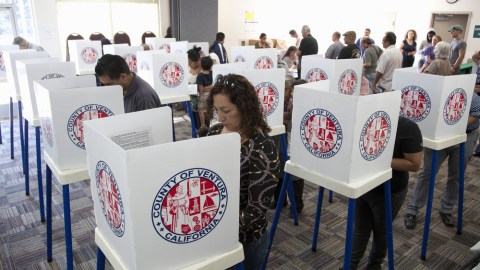Why You Should Still Vote Even If You Think It Doesn’t Matter

In a post from earlier this week, The Week’s Ryan Cooper called the 2014 midterms “perhaps the least consequential American election season in a generation.” He argues that the United States is hurtling toward plutocracy, and that regardless of how you vote, election results are only going to benefit those who have purchased political favor.
At the same time, Cooper makes the case that not voting, even if you have little faith in the system, would be foolish. To vote is to show your worth. If enough people of a certain demographic do it (I’m talking to you, millennials), the two big parties will see that there are underserved demographics they need to appeal to.
Cooper also appeals to the memory of the late British politician Tony Benn, who embraced the revolutionary nature of democracy even though he questioned whether the U.S. (and U.K., for that matter, could call itself one:
“Voting in itself won’t protect your rights or secure beneficial policies. But it is a key first step to getting there. As the British politician and activist Tony Benn once said, ‘I think democracy is the most revolutionary idea in the world. Far more revolutionary than socialist ideas or anybody else’s ideas — because if you have power, you use it to meet the needs of you and your community.'”
Benn marveled at democracy’s ability to transfer social power from the marketplace to the polling place. To completely forgo voting would be to abdicate what little power society grants you. In a way, Cooper’s argument could probably be summed up as “the only thing worse than voting is not voting.”
Read more at The Week
Photo credit: American Spirit / Shutterstock





